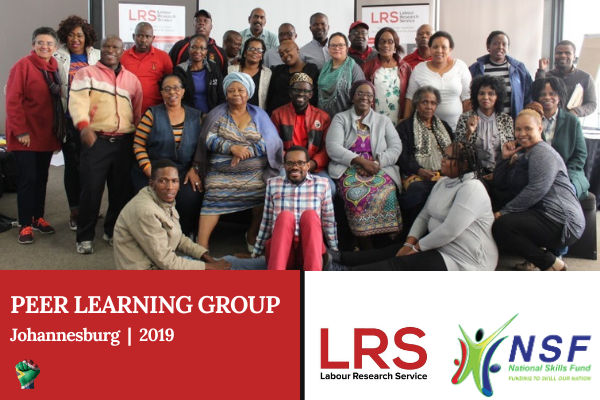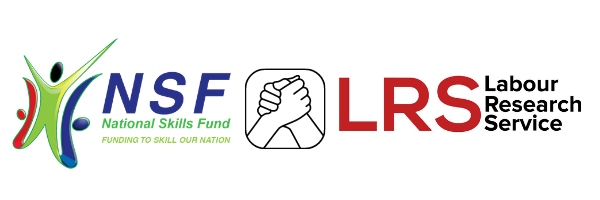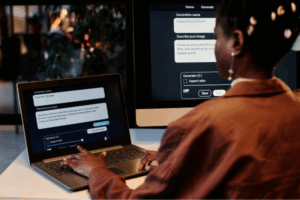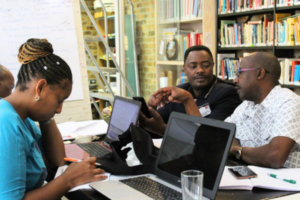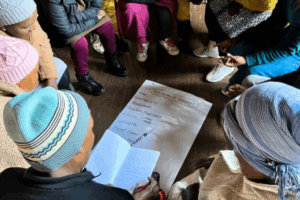From 20-23 August 2019, the Labour Research Service (LRS) with the support of the National Skills Fund hosted the second peer learning workshop for 29 worker leaders involved in our broader project seeking to address information and skills asymmetries in collective bargaining in South Africa. The worker leaders from 12 sectors met for the first time in May and began the process of crafting a model Inclusive Collective Bargaining Agreement (ICBA), which will be published in our new guide for union negotiators. The envisioned ICBA will be shaped by the needs of all workers and will take into account the changing workplace and the need for collectives to respond to the changes.
Snapshot of workshop participants
The worker leaders involved in our process of developing a guide for negotiators have between one to ten years of experience in their respective organisations. They are negotiators at the plant/company, provincial and national levels.
The following sectors were represented in Peer Learning 2 workshop:
- Contract Cleaning: members of South African Transport and Allied Workers Union (SATAWU)
- Private Sector security: members of South African Transport and Allied Workers Union (SATAWU)
- Domestic Work: members of United Domestic Workers of South Africa (UDWOSA) and South African Domestic Service and Allied Workers Union (SADSAWU)
- Health Care Work: members of Health & Other Services Personnel Trade Union of South Africa (HOSPERSA) and care workers from Ward Based Health Outreach Teams (WBHOTS)
- Education: members of the South African Democratic Teachers Union (SADTU)
- Petrol Attendants: members of the National Union of Metalworkers of South Africa (NUMSA)
- Retail and Hospitality: members of South African Commercial and Catering Workers Union (SACCAWU)
- Waster picking and municipal work: members of the African Reclaimers Organisation (ARO) and South African Municipal Workers Union (SAMWU)
- Migrant Work: members of the Migrant Workers Union of South Africa (MIWUSA)
- Informal Trading: members of the Johannesburg Informal Traders Platform (JITP)
RECAP of Peer Learning 1
In the workshop in May, the worker leaders started the conversation on an inclusive collective bargaining agreement. We identified the gaps in the existing agreements. We identified the priorities to strengthen collective bargaining agreements in the 12 sectors and began mapping the strategies for achieving the priorities.
Peer learning 2 in August reunited the worker leaders who enthusiastically shared their experiences over the past three months. Some emerging common threads included increased confidence in dealing with workplace issues, a better understanding of other sectors and increased confidence in confronting masculine leadership cultures, particularly in male-dominated sectors. As facilitators, we sought to know what exactly happened in Peer Learning 1 to bring about the increased confidence and why the worker leaders felt it was important to have a better understanding of other sectors. The worker leaders said they felt more confident to: Include the needs of workers who’ve been traditionally excluded from collective bargaining agendas; identify and include issues relevant to the changing nature of work in the collective bargaining agenda.
“Our confidence was increased because knowledge is power. In our workplaces, some issues can be overlooked easily. The peer learning helped to surface some of the overlooked issues. We can now deal with those issues from a position of knowledge. We also feel more confident because the knowledge we hold has been validated.”
- Union official, HOSPERSA
“I had a lot of pending cases before I came to the workshop. The information shared by comrades on using the sectoral determination effectively has given me the confidence to handle the backlog. As worker leaders, we must learn the relevant labour laws and regulations and how to apply them well to protect workers.”
- Union official, SATAWU
“I thought it’s only in our sector with many workers who don’t understand their rights fully. I now realise the importance of building solidarity across sectors. United we can learn and achieve a lot. I can now easily mobilise our constituency to improve our working conditions as waste pickers.”
- Official, African Reclaimers Organisation
“Certain issues were unclear before I came for Peer Learning 1 Workshop, for example, implementation and enforcement of some labour laws and regulations. I think the gaps in knowledge and information is because we don’t have enough time to read. At the workshop, we learned more about labour laws. The strategies we have learned will assist to negotiate for some specific issues facing our members. Since the first workshop three months ago, I have gained confidence and improved how I work.”
- Union official, MIWUSA
"Coming from the informal sector, I initially didn’t feel confident to share the same space with officials of some of the biggest unions in South Africa. But I quickly discovered we have a connection as workers and can use it to our advantage to improve our lot. Workers’ issues are very similar and we need to support each other across sectors. The workshop surfaced the importance of having and sharing information. I have gained more confidence to speak up and contribute to the process.”
- Official, JITP
A better understanding of other sectors
“I didn’t understand the reclaimers. I dismissed them and assumed they are pesky drug addicts. Knowledge of other sectors is important. I realised that this is a job for someone, a job that has built a family. I sort out my garbage and I don’t get irritated when I see someone working through my bin. I now have empathy and want to assist, offer guidance, and create awareness in my community.”
- Union official, HOSPERSA
“We thought petrol attendants are the most vulnerable workers before we started this process. I am learning new things and starting to think of how I can communicate the information in a simple way to the workers on the shop floor.”
- Union official, Union official, NUMSA
"Our union aims to organise migrant workers in all sectors. So far we’ve managed to penetrate three sectors. We were exposed to other sectors in the workshop and gained information that has improved our approach to organizing.”
- Union official, MIWUSA
“I now have a better understanding of the informal traders. When our unions protest in the streets some people vandalise and steal property belonging to informal traders. This is wrong because informal traders are also workers trying to make a living. As a leader in my community and sector, I need to use my influence to create awareness about the problems facing workers in vulnerable sectors.”
- Union official, HOSPERSA
LRS workshop facilitators, Nina Benjamin, George Mthethwa and Nosipho Twala noted that the work on the Negotiators’ Manual had been strengthened by examples of issues relevant to present-day collective bargaining scenarios.
Framing Peer Learning 2
The framing question for the workshop was: What will it take for worker leaders and the LRS to create resources that support collective bargaining for workers in precarious forms of employment? By bringing worker leaders across both formal and informal environments into a safe and supportive space to share experiences of and to create strategies for addressing the conditions facing workers in precarious forms of work, we hoped to see the following:
- Worker leaders who feel more confident to redefine collective bargaining to include workers in precarious forms of employment
- Worker leaders more sensitized to recognizing and addressing the discrimination facing workers in precarious forms of employment
- Feedback on materials and methodologies for the LRS Negotiators’ Guide.
Responding to discrimination in the world of work
Workplace discrimination is real but often goes unreported because some workers aren’t aware of their rights and remedial procedures. The Constitution of South African guarantees the right to equality and also gives protection to all from unfair discrimination. The worker leaders identified the forms of discrimination in their workplaces and explored the different ways of responding to discrimination, including using existing policies, laws and conventions, as well as identifying other effective strategies for addressing workplace discrimination.
Demystifying laws and conventions
Using the priority issues identified in Peer Learning Workshop 1, participants worked with a relevant piece of legislation as an example of what exists. The exercise aimed to increase the understanding of the role of legislation in supporting the work being done and how the law can be used to address the identified priorities. One key observation is the majority of workers don’t understand anything about the laws while those who know the laws simply don’t apply them or don’t know how to use them.
You can find photographs taken at the workshop on our Facebook page here, and here.
- Peer Learning Workshop 1 – Creating a Model Inclusive Collective Bargaining Agreement
- The Negotiator’s Guide – A guide to negotiating in a changing workplace


